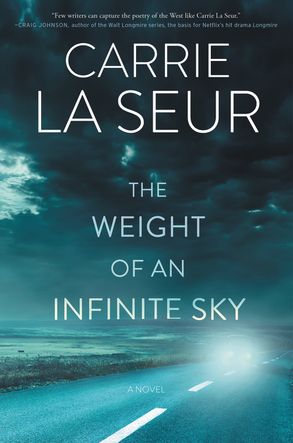The Weight of an Infinite Sky by Carrie La Seur
/The Weight of an Infinite Sky
by Carrie La Seur
Morrow, 2018
Carrie La Seur follows up her memorably beautiful, understated 2014 debut The Home Place with The Weight of an Infinite Sky, another soft-spoken and convincingly wise novel set in the rural vastness of Montana, this one rather ambitiously patterned on Hamlet. Anthony, the only son of Dean and Sarah and heir to their sprawling ranch outside of small-town Hayden, escaped the choking expectations of his birthright three years earlier and went to New York intent on forging a career for himself in the theater.
As La Seur's spare prose makes clear immediately, this gamble doesn't pay off:
Broadway had been a first chance to live as his real self, to try out what he believed himself to be for people he considered worthy to judge him. The failure of that act, the indifference and even hostility of the audience, had left him feeling like a shade in a world of flesh and blood. In the end, he didn't exist in the way he'd believed himself to exist. He was something less than that. It had taken the matter-of-fact cruelty of New York to show him.
He returns to the ranch and to the badly-needed offer of work, in this case overseeing the summer camp program for the Town Hall Theater in Billings. He's a slightly unsteady, slightly gone-to-seed, slightly self-pitying figure, intermittently defiant and melancholy – a maddening figure, one of recent fiction's best transpositions of Shakespeare's Hamlet into a modern idiom.
The ranch house kept up by his mother remains in his memories “a cave, but a safe one,” and he recalls “the feeling of stumbling inside on a winter's day half snow-blind to the smell of baking and the blast of the woodstove, a sense of being hugged tight.” But there's a shadow over the place now: his strange, off-putting uncle Neal has, as Anthony warns his mother, his own game to play when it comes to the family property – as in so many 21st century American novels, there are sharkish mining concerns circling, offering enormous amounts of money in exchange for things beyond price.
Anthony is caught between the raw admission of a failed dream and the undeniable affection he feels for the land, and he becomes increasingly involved in everything around him – from Neal's scheming to the worryingly darkened life of his cousin Chance, to the feelings Anthony still has for his former flame Hilary. And because the book is working on a Hamlet template, there are added complications that La Seur manipulates with smooth skill – complications that are kicked into high gear when Brittany Terrebonne (the traumatized young girl at the center of The Home Place, here making a re-appearance along with that book's other main character, her aunt Alma) tells Anthony that she just recently saw his father out riding on the horse that threw and killed him in a riding accident that seems less plausible the more Anthony learns about it. The girl saw the mounted ghost at sunrise, and of course such things can't be, but living on the edge of Indian country for most of his life has convinced Anthony that “spirits wandered, when they wandered, for a reason,” and amidst all his other distractions, he decides to ride out to the spot and see what might happen. The echoing of Shakespeare by rights should make the book feel claustrophobic and programmed, but at every turn La Seur makes the right decisions in order to tap into the same primal questions that animate the most famous play of all. Even Anthony's self-consciousness about that play never serves to burst the bubble.
The Weight of an Infinite Sky has all of the lean storytelling grace of The Home Place and noticeably greater resonance. La Seur has entirely avoided the notorious “sophomore slump” that so often afflicts novelists – the book will leave readers hoping for a triple.
Steve Donoghue was a founding editor of Open Letters Monthly. His book criticism has appeared in the Boston Globe, the Wall Street Journal, and the American Conservative. He writes regularly for the National, the Washington Post, the Vineyard Gazette, and the Christian Science Monitor. His website is http://www.stevedonoghue.com.
